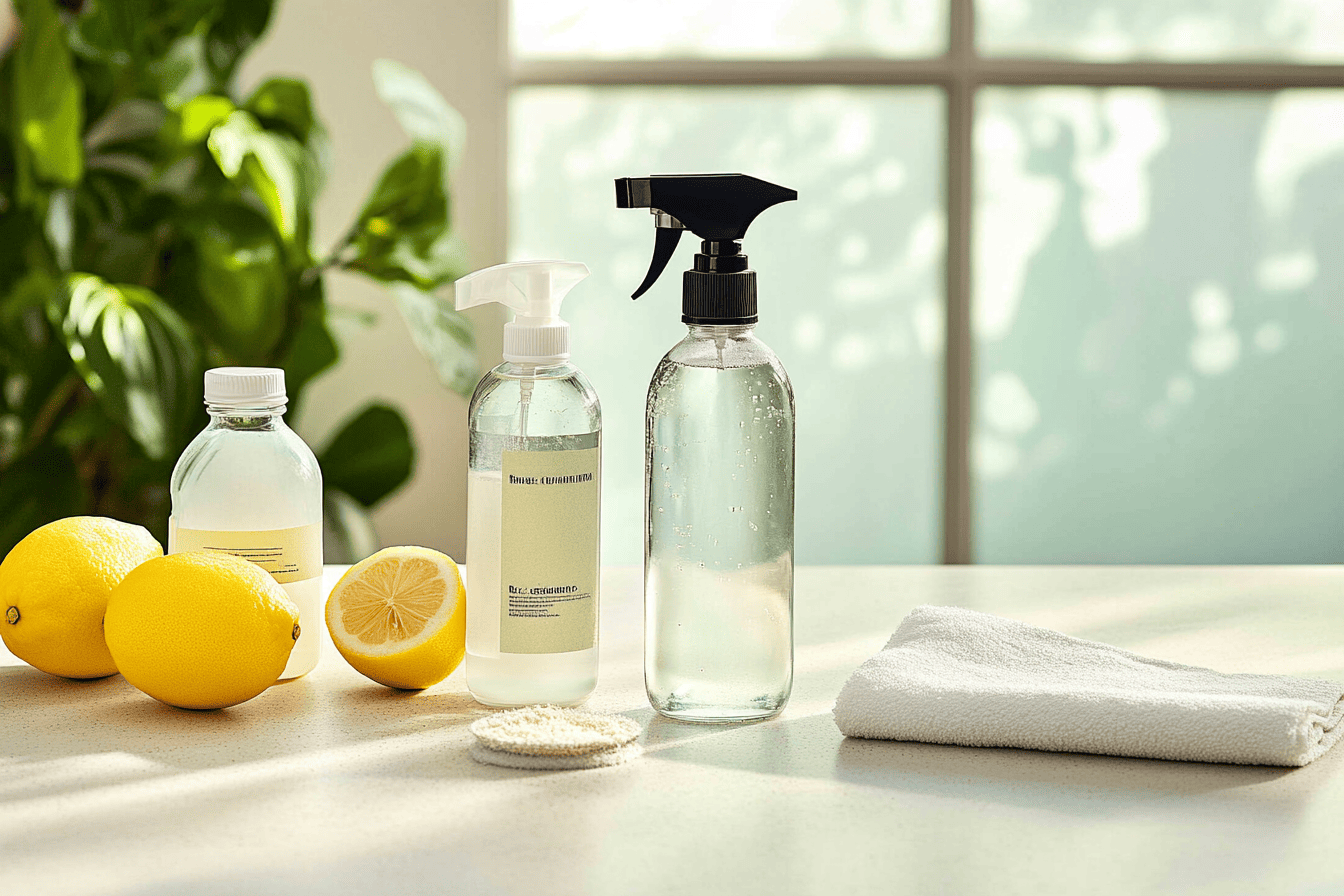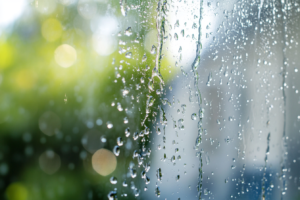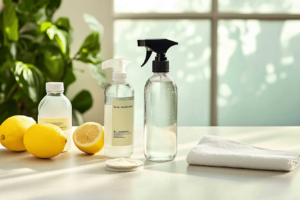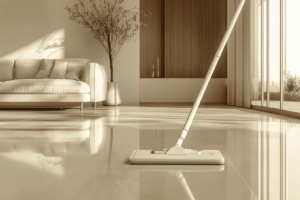Looking for a natural, affordable, and effective way to achieve streak-free windows? Cleaning windows with vinegar is the perfect solution! This eco-friendly ingredient cuts through dirt, eliminates streaks, and leaves your glass sparkling. Our expert domestic cleaners swear by this hassle-free method for spotless windows—no harsh chemicals needed!

Benefits of Using White Vinegar for Window Cleaning
Environmental and Health Benefits
Vinegar is a natural, non-toxic cleaner, making it a safe choice for your home. Unlike commercial window cleaners, it doesn’t release harmful fumes or contain harsh chemicals. It’s also biodegradable, reducing its environmental impact. Want more expert tips on cleaning with vinegar? Click here to learn from our professional domestic cleaners
Cost-Effectiveness
A bottle of white vinegar costs just a fraction of store-bought window cleaners. Since it’s highly versatile, you can use it for multiple cleaning tasks around the house. A little goes a long way, making it a budget-friendly solution.
Natural Cleaning Power
Vinegar effectively breaks down grease, grime, and mineral deposits. Its acidic properties dissolve stubborn stains and eliminate streaks, leaving your windows crystal clear. Plus, it acts as a mild disinfectant, removing bacteria and odours.
Your DIY Cleaner’s Kit
Before you start, gather the right materials to make the process smooth and efficient.
Essential Materials and Tools
- White vinegar
- Water
- Spray bottle
- Microfibre cloth or lint-free towel
- Squeegee
- Soft sponge or scrub brush (for tougher stains)
Safety Precautions
- Avoid contact with eyes – Vinegar is acidic and may cause irritation.
- Use gloves if you have sensitive skin.
- Ensure good ventilation when cleaning large window areas to reduce the vinegar smell.
- Avoid sensitive parts of your window – Vinegar is safe for glass but can damage certain materials like wooden frames, painted surfaces, and aluminium. To prevent damage, use a damp cloth to wipe down these areas separately with just water or a mild soap solution.
Best Ways to Clean Windows with Vinegar: Step-by-Step Guide
Preparing Your Cleaning Solution
Perfect Vinegar-to-Water Ratio
For general window cleaning, a 50/50 mix of white vinegar and water works best. This balanced window cleaning solution effectively removes dirt and leaves windows clear without any harsh chemicals. However, if your windows have built-up grime or hard water stains, you may need a stronger mixture. In that case, try using two parts vinegar to one part water for extra cleaning power.
Optional Additives for Better Results
- A few drops of essential oil (like lemon or lavender) to mask the vinegar smell.
- A teaspoon of dish soap to cut through heavy grease.
- Rubbing alcohol for a quick-drying effect.
Basic Window Cleaning Method
Pre-cleaning Steps
Before applying your vinegar solution, it’s important to remove any loose dust, cobwebs, or debris. Use a dry microfibre cloth, duster, or soft brush to clear away dirt, especially around window frames and corners. This prevents smudging and makes the cleaning process more effective.
Proper Application Technique
- Spray the vinegar solution directly onto the glass.
- Let it sit for a minute to break down grime.
- Wipe in circular motions using a microfibre cloth or newspaper.
Drying for a Streak-Free Finish
- After wiping, take a clean, dry microfibre cloth and buff away any remaining moisture. This helps eliminate streaks and leaves a polished finish.
- For larger windows or hard-to-reach outside windows, using a squeegee is the best option. Start at the top and pull the squeegee down in a straight motion, wiping the blade with a clean cloth after each pass.
Common Challenges and Solutions
How do i get the cloudy film off my windows?
One of the biggest frustrations when cleaning windows with vinegar is ending up with streaks or a cloudy finish. This usually happens when the cleaning solution dries too quickly, leaving behind residue. To prevent this, clean your windows on a cloudy day. This gives the vinegar time to break down dirt without evaporating too fast.
What is the best homemade window cleaning solution for tough stains?
Hard water stains, grease, and built-up grime can be difficult to remove with a standard vinegar solution. For stubborn stains, apply undiluted vinegar directly onto the stain and let it sit for 5–10 minutes. The acidity in vinegar helps dissolve mineral deposits and break down dirt. If the stain persists, use a soft scrubbing brush or non-abrasive sponge to gently scrub the area.
Getting rid of the smell of vinegar
While vinegar is a fantastic natural cleaner, its strong smell can linger, especially in enclosed spaces. The good news is that the scent disappears as the vinegar dries. However, if you want to mask the odour, try adding a few drops of essential oil (like lemon, lavender, or tea tree) to your cleaning solution. This will leave a fresh, pleasant scent behind. Another trick is to improve ventilation while cleaning.
Maintenance Tips
| Maintenance Tip | Details |
|---|---|
| Regular Cleaning Schedule | Clean windows once a month for general upkeep. If you live in a busy city or near a main road, clean them every two weeks to prevent dirt buildup. |
| Preventive Measures | – Dust windowsills and frames regularly to stop dirt from transferring onto the glass. – Avoid touching glass with greasy hands to minimise fingerprints and smudges. |
| Best Time to Clean Windows | Clean windows in the early morning or late afternoon when the sun isn’t too strong. This helps prevent streaks caused by quick evaporation. |
Alternative Methods and Combinations for Window Cleaning
Using vinegar and newspaper to clean windows
The slightly rough texture of crumpled newspaper acts as a natural abrasive. When paired with vinegar, this method leaves windows spotless and free of lint.
To use this technique, spray your vinegar solution onto the glass and wipe in circular motions with crumpled newspaper until dry. The key is to use black-and-white print rather than coloured newspaper, as ink from some pages may transfer onto your hands.
Vinegar with Baking Soda
For extra-tough stains, grease, or hard water marks, vinegar and baking soda make a powerful combination. To clean with this method, sprinkle a small amount of baking soda directly onto the glass, focusing on problem areas. Then, spray vinegar over the baking soda and let the fizzing reaction break down the grime for a few minutes. Finally, scrub gently with a soft sponge or cloth and wipe clean with a damp microfibre towel.
Safety Considerations and Best Practices
Surface Compatibility
Vinegar is safe for glass, mirrors, and stainless steel. However, avoid using it on wood, stone, or aluminium window frames, as it may cause damage.
Ventilation Requirements
While vinegar is natural, its strong scent can be overwhelming. Open windows or turn on a fan to improve air circulation while cleaning.
Cleaning windows with vinegar is a simple, effective, and eco-friendly way to keep your home looking bright. With the right method and a few handy tricks, you can achieve sparkling, streak-free windows every time. Ready to give it a try? Grab your spray bottle and get started today! Not in the mood for DIY? No problem—Wecasa’s professional cleaners are here to help. Book your window cleaning session now, sit back, and enjoy crystal-clear windows in no time!









